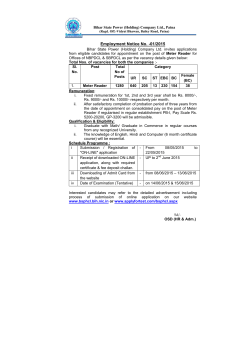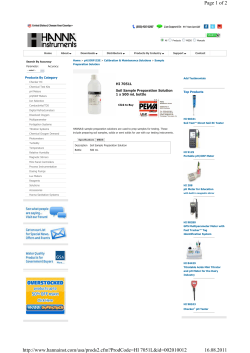
Brochure - India Infrastructure
2nd Annual Conference on METERING IN INDIA Needs & Requirements: Emerging Technologies and New Initiatives July 1-22, 2015, Hyatt Regency, New Delhi Organiser: Co-sponsor so far*: *Lead and Co-sponsorship slots are still available METERING IN INDIA Mission z Metering in India has evolved from merely a measurement of energy consumed to being an important source of consumer data for distribution utilities. Using advanced analytics, utilities are able to protect their revenues, forecast demand and plan their power procurement strategies. z Utilities are deploying state-of-the-art meter technologies such as automated meter reading (AMR). This technology provides capabilities like outage management, data analytics, tamper detection and network management. It also reduces the chances of error and improves billing efficiency. Utilities are also using in-home displays and remote connect/disconnect facilities at feeders, transformers and consumer premises to improve revenue management and optimise profitability. z As utilities move towards implementing smart grid technologies, the adoption of advanced metering infrastructure (AMI) will accelerate. AMI systems come with a range of capabilities such as load management and outage handling, remote meter reading, remote connect and disconnect, and automated and timely billing. z The adoption of prepaid metering in the country is still limited to select segments such as temporary connections, government buildings and rented premises to improve collection efficiency. There is a need for regulatory clarity to increase the adoption of such meters. Complex tariff structures are also a key hindrance in this regard. z Some states like Karnataka, Maharashtra and Delhi have introduced time-of-day (ToD) tariffs, but the pricing signal has been low. The ToD tariff design needs to ensure that consumers are willing to reduce their load rather than pay higher electricity bills for certain time blocks. z Meter testing plays an important role in ensuring that meters conform to the required standards. Poor quality and faulty meters can lead to lower revenues and higher losses for utilities. Apart from the predefined tests, some utilities undertake tests that are especially designed to suit their specific needs, such as impulse voltage, frequency variation and limits of error. z With advancements in metering technology, various communication protocols are needed to collect meter data and control communication flows. Different communication technologies such as PLC, GPRS, ZigBee and radio mesh are currently being used. Manufacturers are looking at advancements in communications technology that are widely accepted by utilities and offer better reading efficiency. z The R-APDRP, which was the key driver for investment in metering by state distribution utilities, has been subsumed in the new Integrated Power Development Scheme (IPDS). The scheme has an outlay of Rs 17.1 billion for consumers, feeders and DT metering (including smart meters), and has made private discoms eligible for financial assistance. z The mission of this conference is to provide a platform for key stakeholders to discuss the opportunities and challenges in metering in India. The conference will focus on the needs and requirements, emerging technologies and new initiatives. Target Audience z The conference is targeted at power distribution companies (public and private), other utilities, meter manufacturers, technology providers, system integrators, key consultants, government/regulatory agencies, other influencers, etc. Delegate Fee z The delegate fee is Rs 22,500 for one participant, Rs 37,500 for two, Rs 52,500 for three and Rs 67,500 for four. z There is a special low fee of Rs 5,000 per participant for the power distribution companies (public and private), state-owned gencos, transcos, regulatory authorities, research organisations and academic institutions. z Service tax of 14 per cent is applicable on the registration fee. To register: Call +011-446078357, 41034615, +91-88585900089, email: conferencecell@indiainfrastructure.com, or visit us at www.indiainfrastructure.com July 1-22, 2015, Hyatt Regency, New Delhi AGENDA/STRUCTURE UTILITIES’ PERSPECTIVE METER DESIGN What has been the utilities’ experience in implementing new metering technologies? What are the key design considerations for meter manufacturers? Is the current infrastructure equipped to deploy smart metering solutions? What are the key challenges involved in the design of smart meters? What are the new metering technologies being considered for deployment? How are the evolving standards and specifications impacting meter design? METER MANUFACTURERS’ PERSPECTIVE METER TESTING How is the industry geared up to cater to requirements specific to utilities? What is the current meter testing capacity in the country? What are the new functionalities and technologies being offered by the industry? How are the testing facilities responding to the various changes in meter designs What are the key issues and challenges faced by them? and standards? What are the key challenges involved in meter testing? What are the future METER COMMUNICATIONS requirements in this regard? What are the communication needs and standards associated with meter deployment? What are the emerging technology options for utilities? What has been the experience? STANDARDS AND SPECIFICATIONS/INTEROPERABILITY How are service providers addressing concerns related to reliability and security? What are the technical standards and specifications required for the emerging METER DATA ACQUISITION AND ANALYTICS What are the changes in standards and specifications under consideration? What are the key benefits of meter data acquisition/management systems for utilities? What role do the regulators play in the process of ensuring standards and metering technologies to ensure interoperability? What are the technologies being used by utilities for meter data acquisition? specifications, and interoperability? How can utilities use data analytics for loss reduction and revenue protection? NET METERING AMR AND AMI What are the specific metering requirements of solar rooftop projects? What are the costs and benefits of AMR-based solutions? What are the key What is the current status of the availability of bidirectional meters? technology options? What are the technologies currently being deployed? What are the key challenges in implementing AMR solutions? What are the infrastructural requirements for implementing AMI-based systems? How can utilities scale up their metering infrastructure for future AMI-based solutions? PREPAID METERS What is the current status of prepaid meter deployment by utilities? What are the benefits offered by prepaid meters? TOD METERING What is the outlook for this segment? What has been the experience in implementing new tariff structures such as ToD tariffs? What is the status of demand-side management and demand response? IPDS AND LESSONS FROM THE R-A APDRP How can regulatory steps (such as ToD tariffs) influence demand response? What have been the key learnings drawn from the R-APDRP as far as metering THEFT PREVENTION AND REVENUE PROTECTION What is the scope for metering-related works under the IPDS? What are the key discom initiatives to prevent meter tampering and power theft? What is the current status and what are the milestones to be achieved under is concerned? How are the discoms reducing losses and maximising revenue? What has been the the IPDS? learning so far? What are some of the best practices in this regard? Previous Participants The organisations that have participated in our previous conference on “Metering in India” include: Akshyan Power, Solutions, Analogics Tech India, Aurum Equity Partners, Bentec Electricals, BESCOM, BSES Rajdhani Power, Bureau of Indian Standards, Carnegie Mellon University, Central Electricity Authority, Central Power Research Institute, CESC Limited, Cyan Technology, Dakshin Haryana Bijli Vitran Nigam, DVVNL, Electrical Research and Development Association, Feedback Infra, Genus Power Infrastructures, Infosys, Itron, JnJ Powercom Systems, L&T Technology Services, Larsen & Toubro Construction, Madhya Pradesh Paschim Kshetra Vidyut Vitran, Madhya Pradesh Poorva Kshetra Vidyut Vitran, Maharashtra State Electricity Distribution Company, MTE Services, National Power Trading Institute, Paschimanchal Vidyut Vitran Nigam, Powrtec Energy, Punjab State Power Corporation, Rajasthan Rajya Vidyut Prasaran Nigam, Sai Computers, Schneider Electric, Secure Meters, Selec Control, Siemens, Southern Power Distribution Company of Andhra Pradesh, Tata Power Delhi Distribution, Tata Teleservices, Texas Instruments, UGVCL, Uttar Haryana Bijli Nigam, West Bengal State Electricity Distribution Company, Zera India, etc. To register: Call +011-446078357, 41034615, +91-88585900089, email: conferencecell@indiainfrastructure.com, or visit us at www.indiainfrastructure.com 2nd Annual Conference on METERING IN INDIA Needs & Requirements: Emerging Technologies and New Initiatives July 1-22, 2015, Hyatt Regency, New Delhi Registration Form I would like to register for the conference. I am enclosing Rs_______________________________vide cheque/demand draft no.___________________ drawn on __________________________dated ______________ in favour of India Infrastructure Publishing Pvt. Ltd. payable at New Delhi. Please send wire transfer payments to: Beneficiary India Infrastructure Publishing Private Limited Bank Account No. 094179587002 Bank Name The Hongkong and Shanghai Banking Corporation Ltd Swift Code HSBCINBB IFSC Code HSBC0110006 Bank Address R-47, Greater Kailash-1, New Delhi-110048, India Sponsorship opportunities are available Name(s)/Designation (IN BLOCK LETTERS) Company Mailing Address Phone Mobile Fax E-mail Registration Fee Delegates INR Two Three Four 22,500 37,500 52,500 67,500 3,150 5,250 7,350 9,450 Total INR 25,650 USD (inclusive of service tax) 470 42,750 780 59,850 1,090 76,950 1,400 Service tax (14%) INR z z z One z z The conference is being organised by India Infrastructure Publishing, the leading provider of information on the infrastructure sectors through magazines, newsletters, reports and conferences. The company publishes Power Line, Smart Utilities, Renewable Watch, Indian There is a special low fee of Rs 5,000 per participant for the power distribution companies (public and private), state-oowned gencos, transcos, regulatory authorities, research organisations and academic institutions. Registration will be confirmed on receipt of the payment. To register online, please log on to http://indiainfrastructure.com/conf.html Infrastructure and tele.net magazines as well as Power News (a weekly newsletter) and a series of reports on the energy sector including Power in India, Transmission in India and Distribution in India. Payment Policy: z Organisers Full payment must be received prior to the conference. Conference fee includes lunch, tea/coffee and conference material. Conference fees cannot be substituted for any other product or service being extended by India Infrastructure Publishing Pvt. Ltd. For delegate registrations, contact: Deavanjan Ranjan Tel: +011-446078357, 41034615, +91-88585900089 For sponsorship opportunities, contact: Varun T. Boyle Tel: +91-111-441034610, +91-99999430521 Conference Cell, India Infrastructure Publishing Pvt. Ltd., B-117, Qutab Institutional Area, New Delhi 110016. Fax: +91-111-226531196, 46038149. E-m mail: conferencecell@indiainfrastructure.com
© Copyright 2025









